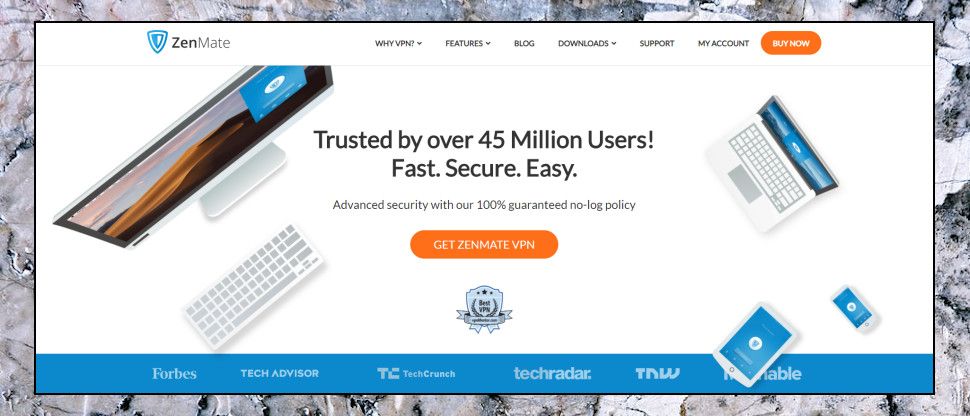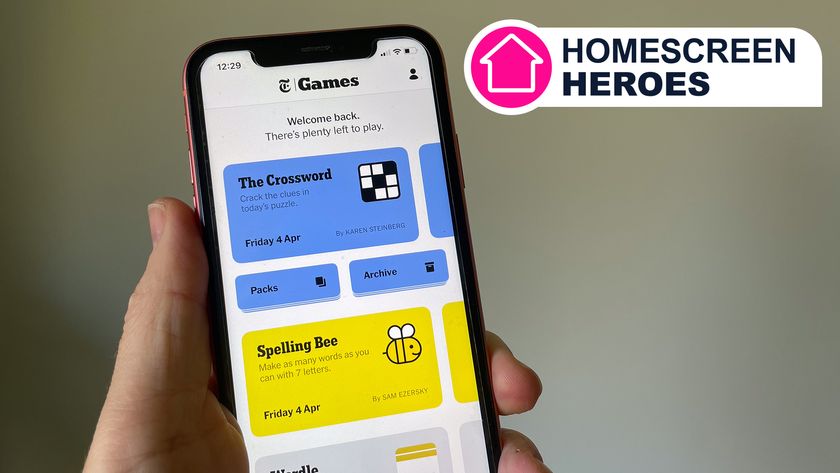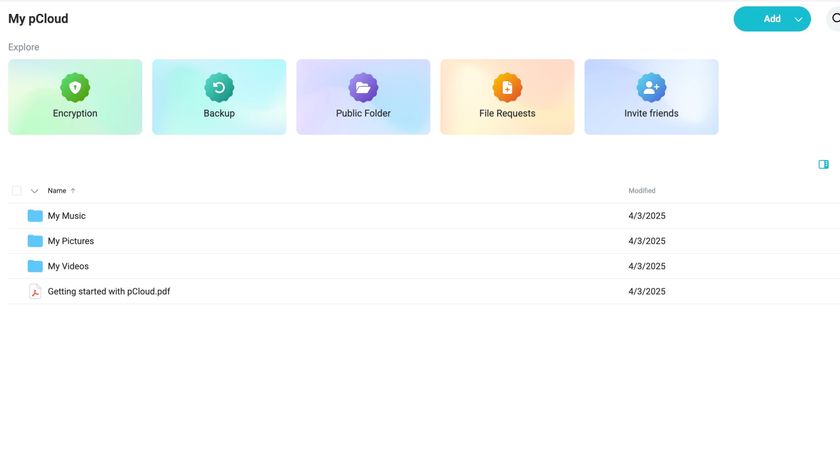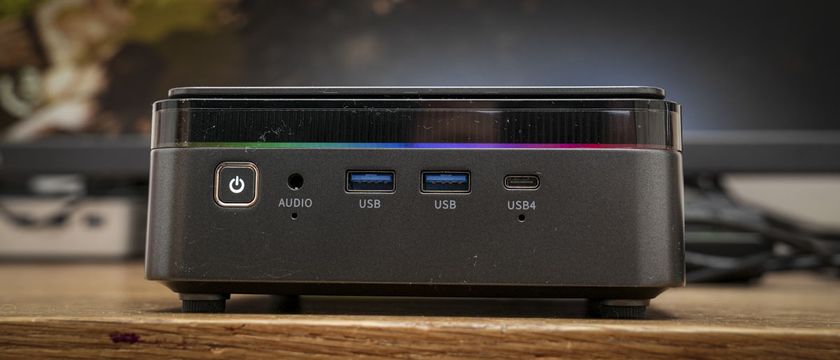TechRadar Verdict
It's short on features and configurability, but solid speeds, reliable Netflix-unblocking and very low three-year price mean ZenMate is still a very attractive proposition. If simplicity and value are your top priorities, then give the company a try.
Pros
- +
7-day free trial
- +
No limit on simultaneous connections
- +
Cheap three-year plan
- +
Unblocks Netflix, Disney+, Amazon Prime Video, BBC iPlayer
Cons
- -
Short on features
- -
Below-par support site
- -
Apps aren't updated often
- -
Poor privacy policy and no security audit
Why you can trust TechRadar
ZenMate is a simple VPN aimed at non-technical users who want an easier way to protect their online privacy.
This more newbie-oriented approach starts with the website. There's no jargon, no complicated feature lists, just a quick explanation of VPN technology and some example benefits. The service is mostly about the core basics.
There are plenty of locations on offer, with 3,000+ mostly torrent-friendly servers across 78+ countries, up from 74 at our last review. That's now more countries than NordVPN (59), Windscribe (63) and Surfshark (65), although it's still lagging behind ExpressVPN's 94.
- Want to try ZenMate? Check out the website here
Platform coverage is good, with apps for Windows, Mac, iOS and Android, and browser extensions for Chrome, Firefox, Opera and Edge.
ZenMate is owned by Kape Technologies, the company behind CyberGhost, and most of its apps are based around CyberGhost technology. (The Windows client is essentially CyberGhost 7 with a ZenMate frontend, for instance.) They're not exactly crammed with features, but you do get built-in DNS leak protection and kill switches to help shield your activities from snoopers.
Even better, you can set up and use the service on as many devices as you need - ZenMate doesn't have any annoying connection limits.
ZenMate hasn't exactly been piling on the new features recently. As we write, the iOS app hasn't been updated since 2019, for instance. But there is some good news in the arrival of WireGuard on Android.
ZenMate review: Plans and pricing
ZenMate pricing starts at $10.99 billed monthly, within the typical $10-$13 range we see with most providers.
Annual prices are fractionally below average at $4.49. But if you're thinking that's a little more than you'd like to pay, no problem: ZenMate's three-year plan is considerably cheaper at a tiny $1.64 a month.
There's no six-month ZenMate VPN Ultimate plan any more, and annual prices are now an effective $4.49 a month, up from $3.33 during our last review.
If you're thinking that's a little more than you'd like to pay, no problem: ZenMate's three-year plan is considerably cheaper at a tiny $1.64 a month.
This is a slightly strange pricing structure, especially if you look at the plan totals. Sign up for one year and ZenMate charges $53.88 up-front; sign up for three years and it charges $59. Clearly, the company is doing its best to direct you towards the long-term plan, but it seems unfair to complain about that when the price is so low. A handful of companies are even cheaper - Ivacy's five-year deal is currently $1.16 a month - but ZenMate does better than most.
A second ZenMate Pro for Browsers plan, as you might guess, gives you the browser extensions only, but with access to the full ZenMate network, and streaming support. This won't allow you to protect other app traffic, but if you're only interested in unblocking websites, or you do pretty much everything in your browser, anyway, it might be good enough.
ZenMate Pro for Browsers is certainly cheap, at just $5.99 billed monthly, $3.19 on the six-month plan, or $1.99 if you pay for a year up-front.
Whatever you choose, the company gives you a seven-day free trial to test the service before you get billed, which is very unusual these days. And even after you've handed over your cash, you're further protected by a 30-day money-back guarantee.
Privacy and logging
ZenMate's main website is straightforward, but poking around in the darker corners – in particular, the privacy policy and terms of service pages – revealed some of the most brain-numbingly over-complicated legalese we've ever seen.
Just about every element takes longer to describe than it should, and seems written for lawyers rather than regular users. For instance, we're told that "by registering for a nongratuitous ZenMate Service and having completely entered the payment information into the system, you submit a binding offer on the conclusion of a contract regarding the use of the respective ZenMate Service."
Uh-huh.
The documents also make little effort to highlight details that might interest VPN users, such as clarifying what sort of logging takes place, or ZenMate's response to legal actions. The privacy policy is more than 4,000 words long, but the closest it gets to anything useful is a throwaway comment: '...activity done by the user inside the ZenMate VPN tunnel, which is NOT recorded, logged or stored at all.'
Instead, the document spends most of its time on examples and situations that aren't the tiniest bit relevant to the average user. Would you like to know when the company might process your personal data, for instance? Here's how it's explained:
'In rare cases, the processing of personal data may be necessary to protect the vital interests of the data subject or of another natural person. This would be the case, for example, if a visitor were injured in our company and his name, age, health insurance data or other vital information would have to be passed on to a doctor, hospital or other third party. Then the processing would be based on Art. 6(1) lit. d GDPR.'
Dig into the support pages and you'll find a few very general descriptions of ZenMate's no-logging promises. Here's an example:
"We do not store or log your personal data which can be used to identify you or what you're doing online. We do not monitor your online sessions. In fact – we can’t! Strict German privacy laws regulate our company’s use of your information. As we don’t store the data in the first place, this also means that we can’t be forced into giving away personal data to any government or sell it to any 3rd parties."
Well, that's good to hear, but we would much prefer ZenMate to formally spell this out in a privacy policy which the average customer might actually be able to read. Or better still, follow providers such as TunnelBear and have its systems publicly audited to confirm that the company is doing what it promises.

Performance
We checked out ZenMate's performance using various benchmarking services, including SpeedTest's site and app, Netflix' Fast.com, TestMy.net and more.
After connecting to our nearest server from a UK data center with a 1Gbps connection, we repeated each test at least five times. We ran the same tests with both OpenVPN and IKEv2 protocols, and ran the full test set in morning and evening sessions.
UK OpenVPN speeds were above average at 290-300Mbs. A few services managed fractionally better OpenVPN results - TunnelBear reached 290-370Mbps, TorGuard hit 350-375Mbps - but ZenMate beat most of the competition.
UK IKEv2 speeds were even higher at 400-500Mbps, similar to the WireGuard speeds we've seen from some VPNs.
These are good results, and when WireGuard arrives on the Windows client (which could be imminent, as it's just appeared on the Android app), we might see even more.
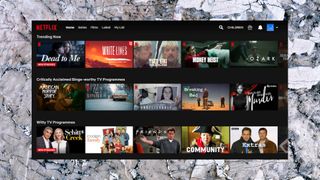
Netflix and streaming
Connecting to a VPN can not only get you a virtual identity in another country, but may also give you access to content you wouldn't be able to access otherwise, such as YouTube clips which are only available in specific locations.
Some sites attempt to detect and block access via VPNs, so to check this, we test whether a service allows access to BBC iPlayer, US Netflix, Amazon Prime Video and Disney+. As streaming platforms sometimes might block one server but not another, we run each test three times with three different IP addresses.
ZenMate's Windows client includes a Streaming section with locations optimized for specific services. That's better than you'll see with many VPNs, who might offer multiple cities in a country, but leave you to try them one by one until you find something that works.
The system got off to a great start with BBC iPlayer, getting us in with all three of our test locations. (That's especially good news, as it failed during our last review.)
ZenMate successfully unblocked US Netflix for us, too, again with each of our test connections. Netflix works hard to block VPNs and there's no guarantee this will last, but ZenMate has unblocked Netflix for three reviews in a row, suggesting the VPN is making real efforts to support the service.
It's not just about Netflix, though: the service also unblocked Amazon Prime Video and Disney+ with each of our three trial connections, giving it a perfect 100% record in the unblocking tests.
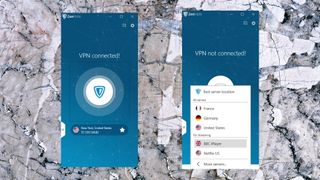
Windows client
Signing up with ZenMate is quick and easy. Newcomers to the service get a 7-day free trial, and you're still protected by a 30-day money-back guarantee if it doesn't work out.
As we mentioned earlier, ZenMate's Windows client is essentially CyberGhost 7 with some of the extras removed (there's no ad or tracker blocking, for instance), and ZenMate branding.
That's mostly good news, as it's a capable client with a familiar and easy-to-use interface.
Launch it and you're presented with a default location, a list with more countries, and a big Connect button. Even total VPN newbies will quickly figure out what to do.
The location list is smarter than most. You can filter it by location type (all, torrenting, streaming), sort it by distance or server load, and save commonly used locations as favorites for speedy recall later.
Double-click a location, and the client displays a desktop notification when it connects: simple.
Connection times were a little slower than some at up to 12 seconds for OpenVPN, 4-6 for IKEv2. The best performers average around 2 seconds for IKEv2 to reach the nearest location, 6-8 seconds for OpenVPN.
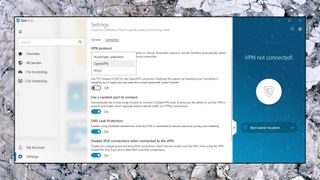
A Settings panel includes a choice of protocol. In common with many other VPNs, ZenMate has dropped support for older protocols, so there's no L2TP anymore; you only get IKEv2 and OpenVPN TCP or UDP. (As we mentioned above, WireGuard is now available on Android, so should appear on Windows soon.)
Other options include the ability to connect via a random port to bypass some VPN blocking schemes, along with options to block DNS and IPv6 leaks. You're able to have ZenMate automatically connect when your system starts, and optionally choose your preferred server (you could have the client automatically connect to the US Netflix location as soon as it launches, for instance.)

The client also has a kill switch, which aims to protect you by blocking internet traffic if the VPN connection is lost. We forcibly closed the VPN connection when using each protocol, and the client immediately blocked our traffic and reconnected, every time, without ever leaking any data.
We noticed a small problem: the client didn't display a notification to warn of us the lost connection, and so if the VPN dropped in a real-world situation, all you would see is that your internet is down, with no clear reason why. ZenMate scored where it mattered by protecting our privacy, though, and as normally it reconnects within seconds, you may not even notice anything had happened.
Put it all together, and although the client isn't outstanding, it's easy to use and handles the VPN basics well.

Mobile apps
ZenMate's Android VPN app has a very similar stripped-back design to its desktop cousin: the current location ('Auto select' by default), a big On/Off button, and a tiny menu icon.
This keeps it very simple to operate. If you just need to encrypt your current connection, there's no need to do anything beyond hit Connect when you start, and Disconnect when you've finished.
The location list is slightly simplified from the desktop, with no server latency or distance details, but the same option to view ZenMate's specialist streaming locations and a Favorites system to save your most commonly used servers.

The app now supports OpenVPN and WireGuard, and has a handful of connection tweaks: an option to connect using a random port, another to use TCP instead of UDP, and a Domain Fronting feature which may help bypass some VPN blocking.
Overall, ZenMate's Android app gets the basic VPN job done, but although it's good to see the arrival of WireGuard, the app is very short on features. It scores for ease of use, but if you're looking for power or configurability, prepare to be disappointed.
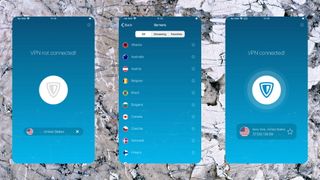
It's much the same story with the iOS VPN app: it looks and feels almost identical to the Android edition (except there's no WireGuard), but there's nothing beyond the most basic features. Its version history shows very little change over the past year, too (as we write, the last update was approaching two years ago), suggesting this isn't going to change any time soon.

Browser extensions
ZenMate's free Chrome, Firefox and Opera extensions provide a simple way to enable or disable the service, and choose new locations, from within the browser interface.
As with all browser proxies, these have their limits – in particular, they only protect your browser traffic, everything else uses your regular connection – but that may be enough for simple website unblocking tasks.
You can use the extensions for free, although you're limited to four locations (Germany, Romania, Singapore, United States), there's no support for unblocking streaming sites, and you'll see regular ads prompting you to buy the full service.
The Chrome VPN extension (and its identical Firefox cousin) opens with a simple console where you can choose a location and connect in a couple of clicks. The location picker looks much the same as the desktop version – it has a list of locations, simple Favorites system, text filter, but no server load or ping time details – and if you've ever used another VPN, you'll figure it all out within seconds.
Bonus privacy features available to free and paid versions include blocking of malicious websites and trackers, and protection from WebRTC leaks. These are disabled by default, but you can turn them on with a click.
Paid users get some worthwhile extras. Stealth Connection automatically removes your cookies, browsing history and cache whenever you disconnect the VPN; Smart Location automatically switches you to a new location whenever you access to a particular site (you could connect to the US whenever you accessed Netflix, say); and a simple Whitelist enables defining websites you'll access through your regular connection, rather than the VPN.
It's a capable feature list, considerably more than you'll get with the average VPN browser extension. And unlike most of the competition, you can try it out entirely for free, courtesy of ZenMate's 7-day trial.
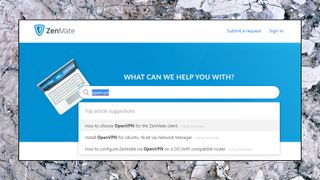
Support
ZenMate's support site opens with a conventional web knowledgebase. Articles are sorted into three categories ('Getting Started', 'Using ZenMate', 'Troubleshooting'), there are links to some of the most common options, and a Recent Activity list covers recently added documents.
This looks promising, until you begin to explore, and problems begin to appear.
We expect a good VPN support site to clearly point users towards detailed setup guides, for instance, but ZenMate left us guessing where its installation advice was. We opted for the 'Getting Started' section, but this only included a single Windows tutorial, an article so basic it could be accurately summed up as 'download the client and log in.'
The 'Platforms That Are Compatible With ZenMate VPN' article looked promising, and sure enough, it included links to setup articles for Android, iOS, desktops and OpenVPN. But the mobile and desktop links opened a new tab at the support site, then automatically redirected to the zenmate.com front page, presumably because the original article no longer exists. And although the OpenVPN page pointed to tutorials for Windows, Ubuntu, Chromebook, Raspberry Pi, macOS and 'More Devices', those links also redirected to the regular ZenMate.com home page.
To be fair, if you keep going and check out the 'Using ZenMate' section, you'll find setup and 'how to use' guides for all platforms. But we expect some users would give up on the site when they found the first links didn't work. And even when you locate the working setup articles, they're still very short on detail. (The Windows 'how to use' guide tells you how to connect, covers the basics of choosing a location, and that's about it.)
We kept looking, though, and did find some useful help. Entering OpenVPN in the search box returned articles on setting up a DD-WRT Router to use ZenMate, for instance. The search engine isn't good at ordering articles by relevance, though, so you might have to scroll through a few articles to find whatever you need.
When we did find substantial content, it could include potentially risky or sometimes unhelpful advice. If you can't get the Windows client to work, for instance, the relevant article suggests you might play around in Device Manager, recreate your network adapters, turn off your firewall or antivirus, or create a new user account and install ZenMate there.
If you're as unsure about this advice as we are, you're able to contact the support team directly. There's no live chat, and the company warns emails could take 48 hours to get a reply, although we had a helpful response in under an hour. That's good news, but we're unsure how typical it might be, and we'd still like a decent web support site to check out first.
ZenMate review: Final verdict
ZenMate isn't perfect by far, but its great unblocking results, high speeds and low long-term prices have a lot of appeal. If you're happy with its relatively basic feature set then take the seven-day trial for a spin, see how it performs for you.
- We've also highlighted the best VPN services
Other VPN providers we have recently tested include:
VPN Gate, Seed4.me, Hideway VPN, BulletVPN, Tuxler VPN, VPNsecure, b.VPN, FastestVPN, X-VPN, SuperVPN, VeePN, ProXPN, Dashlane VPN, TouchVPN, Goose VPN, SlickVPN, Namecheap VPN and VPN Proxy Master

Mike is a lead security reviewer at Future, where he stress-tests VPNs, antivirus and more to find out which services are sure to keep you safe, and which are best avoided. Mike began his career as a lead software developer in the engineering world, where his creations were used by big-name companies from Rolls Royce to British Nuclear Fuels and British Aerospace. The early PC viruses caught Mike's attention, and he developed an interest in analyzing malware, and learning the low-level technical details of how Windows and network security work under the hood.
